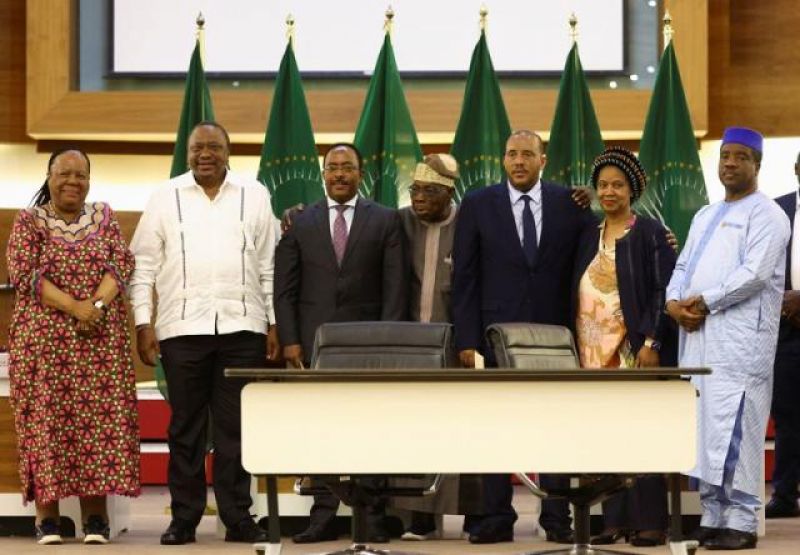Ethiopia, Africa's second most populous country, has been wracked by a devastating conflict between government-aligned troops and TPLF-aligned forces since November 2020, leaving thousands dead and millions in desperate

Anteneh Desalegn, 41, a direct victim of Northern Ethiopia's two-year conflict, is cautiously optimistic that the ceasefire agreement signed by the Tigray People's Liberation Front (TPLF) and the Ethiopian government will potentially end the bloodshed and bring about long-term peace.
One of the conflict's focal points has been Desalegn's hometown, the formerly tranquil mountain town of Sekota in Ethiopia's Amhara region, close to the border with Tigray and about 870 kilometers from Addis Abeba.
Ethiopia: Truce Agreement Sparks Hope for Long-Term Peace
Desalegn, a father of two, has witnessed recurrent conflict for the past two years as the government and regional Tigray forces have repeatedly exchanged control of the area. "You can imagine how difficult life would be if there were no electricity or other necessities for two years.
This is in addition to the destruction and devastation caused by the fighting for our infrastructure and population. Thursday saw Desalegn's statement.

Ethiopia, Africa's second most populous country, has been wracked by a devastating conflict between government-aligned troops and TPLF-aligned forces since November 2020, leaving thousands dead and millions in desperate need of humanitarian assistance.
THE FIRST STEP TO LONG-TERM PEACE
The Ethiopian government and the TPLF declared an agreement to end the conflict earlier on Wednesday, as the conflict in Northern Ethiopia entered its second year.
The ceasefire agreement gives Ethiopians from all walks of life who have been waiting for the battle to end hope. However, Desalegn said the peace agreement would only be significant if it led to long-term peace on the ground, recalling the shock and distress the conflict caused in his life and the millions of lives of others.
We are delighted that they have concluded to end the conflict and, hopefully, end our ongoing suffering because our neighborhood was one of the hard hit by the fighting, Desalegn said.
"While it is unfortunate that the peace agreement was reached after many people had died and countless others had been affected by the conflict, we are happy and satisfied that they have agreed to end the fighting.
The African Union (AU) led negotiations, which were facilitated by Olusegun Obasanjo, a former president of Nigeria and the AU's high representative for the Horn of Africa, as well as former Kenyan president Uhuru Kenyatta and former South African deputy president Phumzile Mlambo-Ngcuka, resulted in the signing of the peace agreement in Pretoria, South Africa, just days later.
At a press conference to discuss the results of the negotiations, Obasanjo stated that the two parties to the conflict in Ethiopia have formally agreed to a cessation of hostilities and orderly disarmament.
He claims that the agreement also covers the restoration of services, law, order, and unrestricted access to humanitarian aid.
While the ceasefire is greatly appreciated, Tewodros Beshah, a private employee in Addis Abeba, the capital of Ethiopia, argued that its practical implementation is "much more critical."
When I learned about the ceasefire agreement, I was shocked, Beshah said. But unfortunately, the conflicting parties' extreme positions before arriving in South Africa led many of us to believe it would be a long-lasting war.
Noting the fragile overall security situation in Northern Ethiopia, Beshah stated that the agreement is the first step toward establishing lasting peace.
"As we say in Ethiopia, the first stage is the most challenging because it is fraught with doubts, uncertainties, and fears. However, now that we have begun the path to peace, we must all strive for its success because we do not have a second chance, "Beshah stated.
THE WAY TO RECONCILIATION
Many analysts and experts argue that the conflict, besides a humanitarian crisis in Ethiopia's three affected regions of Afar, Amhara, and Tigray, has seriously jeopardized the country's social fabric.
They stressed that targeted reconciliation initiatives should be implemented to heal the generations-old bond between the affected neighboring communities to achieve a long-term solution to the conflict.
Costantinos, The affected communities must be at the center of the peace process, claims Bt. Costantinos, a professor of public policy at Ethiopia's Addis Abeba University, if the East African nation is to achieve the fundamental goals of the peace agreement.
Desalegn, unable to work because of the conflict, has emphasized how crucial it is to offer affected people psycho-social support and other forms of assistance.
"People in conflict-affected areas have been greatly affected by the fighting; their lives have been shattered, and their future remains uncertain. Addressing these challenges and restoring affected people's lives and livelihoods should be part of the peace process, "Desalegn explained.

